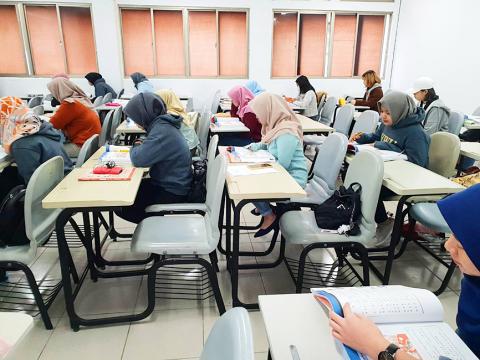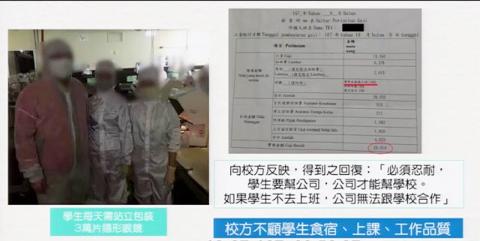Hundreds of Southeast Asian students recruited to Taiwanese universities under the government’s New Southbound Policy have allegedly been tricked into doing illegal work at factories, with some working 10 hours per day, Chinese Nationalist Party (KMT) Legislator Ko Chih-en (柯志恩) said yesterday.
At least six schools have allegedly collaborated with employment agencies and companies to make their students provide cheap labor, Ko told a meeting of the Legislative Yuan’s Education and Culture Committee.
One school, which she later identified as Hsing Wu University in New Taipei City’s Linkou District (林口), arranged for its students to work 10 hours per day, four days per week at an optics manufacturer, she said.

Photo courtesy of Hsing Wu University
“They had to stand for 10 hours and package 30,000 contact lenses every day” and were banned from taking any leave, she said.
When students told the school about their work, it replied that they “must help the company so that the company can help the school,” she said.
The students were assigned to shabby dormitories in Hsinchu to be near their work, she said, adding that the rooms did not have desks.

Photo: Lin Hsiao-yun, Taipei Times
“Two days a week, they would have to wake up at 5am and be driven to Linkou for classes on a bus [arranged by the school] that departs at 6am,” she said.
Employment agencies tricked many of the approximately 200 students into applying for the program through advertisements claiming that they would be offered free accommodation and meals, as well as a monthly salary of about NT$20,000 for “internship” work, Ko said.
However, after arriving, the students realized that starting from their sophomore year, they would need to pay more than NT$40,000 every semester for tuition, accommodation and other expenses, which placed them under great financial pressure, she said.
“This is not an isolated case, but a reoccurring pattern” that shows how schools, employment agencies and companies are taking advantage of the New Southbound Policy internship program designed to encourage students from Southeast Asia to take classes and complete internships, she said.
“Schools offer internship programs and receive subsidies from the Ministry of Education, and employment agencies trick students into joining the programs,” Ko said. “Schools then arrange for internships at companies, which pay employment agencies for introducing the workers.”
Many agencies have boasted about how students recruited under the program are more “useful” than migrant workers, as they are not subject to labor law restrictions, she said.
The ministry has been aware of the problem since last year and has warned schools against recruiting students through employment agencies, Acting Minister of Education Yao Leeh-ter (姚立德) said.
“Those found to have done so would lose subsidies and be banned from offering international internship programs and, in more serious cases, required to receive special consultation,” he said.
The ministry’s international internship program requires review, he added, promising to launch investigations into all schools involved.
Students can perform part-time work that is unrelated to their school work as long as it does not exceed 20 hours per week, he said.
“If students are exploited, we would definitely intervene,” he added.
Hsing Wu University did not recruit students through employment agencies and only helped arrange legal part-time work for students who needed income to cover their living expenses, university vice president Chen Yi-wen (陳義文) told reporters at a news conference after the meeting.
Companies have provided free accommodation to 25 students and compromised by exempting Indonesian students from night shifts for their prayers, university international section head Kuo An-min (國安民) said, adding that the students’ lives have turned “from black and white to full color” because of the program.
Additional reporting by Rachel Lin

CHAOS: Iranians took to the streets playing celebratory music after reports of Khamenei’s death on Saturday, while mourners also gathered in Tehran yesterday Iranian Supreme Leader Ayatollah Ali Khamenei was killed in a major attack on Iran launched by Israel and the US, throwing the future of the Islamic republic into doubt and raising the risk of regional instability. Iranian state television and the state-run IRNA news agency announced the 86-year-old’s death early yesterday. US President Donald Trump said it gave Iranians their “greatest chance” to “take back” their country. The announcements came after a joint US and Israeli aerial bombardment that targeted Iranian military and governmental sites. Trump said the “heavy and pinpoint bombing” would continue through the week or as long

TRUST: The KMT said it respected the US’ timing and considerations, and hoped it would continue to honor its commitments to helping Taiwan bolster its defenses and deterrence US President Donald Trump is delaying a multibillion-dollar arms sale to Taiwan to ensure his visit to Beijing is successful, a New York Times report said. The weapons sales package has stalled in the US Department of State, the report said, citing US officials it did not identify. The White House has told agencies not to push forward ahead of Trump’s meeting with Chinese President Xi Jinping (習近平), it said. The two last month held a phone call to discuss trade and geopolitical flashpoints ahead of the summit. Xi raised the Taiwan issue and urged the US to handle arms sales to

BIG SPENDERS: Foreign investors bought the most Taiwan equities since 2005, signaling confidence that an AI boom would continue to benefit chipmakers Taiwan Semiconductor Manufacturing Co’s (TSMC, 台積電) market capitalization swelled to US$2 trillion for the first time following a 4.25 percent rally in its American depositary receipts (ADR) overnight, putting the world’s biggest contract chipmaker sixth on the list of the world’s biggest companies by market capitalization, just behind Amazon.com Inc. The site CompaniesMarketcap.com ranked TSMC ahead of Saudi Aramco and Meta Platforms Inc. The Taiwanese company’s ADRs on Tuesday surged to US$385.75 on the New York Stock Exchange, as strong demand for artificial intelligence (AI) applications led to chip supply constraints and boost revenue growth to record-breaking levels. Each TSMC ADR represents

State-run CPC Corp, Taiwan (CPC, 台灣中油) yesterday said that it had confirmed on Saturday night with its liquefied natural gas (LNG) and crude oil suppliers that shipments are proceeding as scheduled and that domestic supplies remain unaffected. The CPC yesterday announced the gasoline and diesel prices will rise by NT$0.2 and NT$0.4 per liter, respectively, starting Monday, citing Middle East tensions and blizzards in the eastern United States. CPC also iterated it has been reducing the proportion of crude oil imports from the Middle East and diversifying its supply sources in the past few years in response to geopolitical risks, expanding